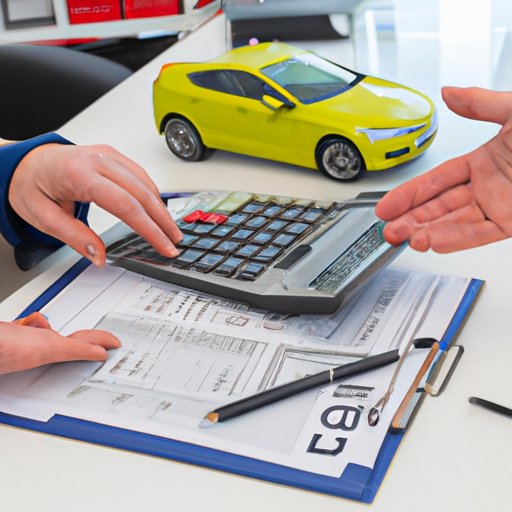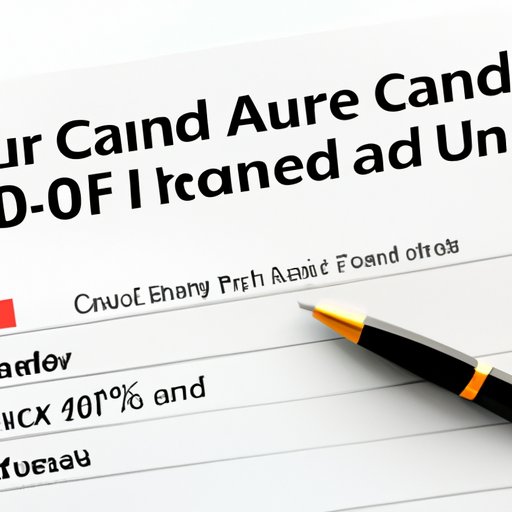Introduction
When it comes to buying a used car, there are many factors to consider – from the make and model of the car to the cost of maintenance and insurance. One of the most important considerations is the finance rate you will be paying for the car. A good finance rate can help you save money in the long run, while a bad one can leave you struggling to make payments.
This article will explore what makes a good finance rate for a used car and provide tips on how to secure low interest rates. We’ll look at the various factors that affect finance rates, including credit score, loan term length, vehicle age and mileage, and loan type. We’ll also examine the different types of finance rates available and compare financing options for used cars.
Examining Factors That Affect Used Car Finance Rates
The finance rate you get for a used car depends on a variety of factors. These include your credit score, loan term length, vehicle age and mileage, and loan type.
Credit Score
Your credit score plays a major role in determining the finance rate you will be offered. Generally speaking, the higher your credit score, the lower the finance rate you can expect. According to Experian, “consumers with a FICO® Score of 800 or higher have an average used car loan interest rate of 4.84%. However, those with a score between 700 and 799 have an average rate of 5.90% and those with a score between 600 and 699 have an average rate of 8.85%.”
Loan Term Length
The length of the loan term also affects the finance rate you will receive. Generally, the longer the loan term, the higher the finance rate, as lenders are taking on more risk over a longer period of time. For example, Experian found that the average used car loan interest rate for a 60-month loan was 6.35%, compared to 5.36% for a 48-month loan.
Vehicle Age and Mileage
The age and mileage of the vehicle you are purchasing also have an impact on the finance rate you will be offered. Lenders may offer lower rates on newer vehicles with lower mileage, as they are seen as less risky investments. On the other hand, older vehicles with higher mileage may be viewed as more risky investments and thus carry higher finance rates.
Loan Type
The type of loan you choose can also affect the finance rate you receive. Typically, secured loans such as auto loans tend to have lower finance rates than unsecured loans such as personal loans. Additionally, some lenders may offer special finance rates for certain loan types, so it’s important to shop around and compare different lenders.

How to Negotiate the Best Finance Rate for a Used Car
Negotiating the best finance rate for a used car can be tricky, but there are a few things you can do to increase your chances of success. Here are some tips to keep in mind:
Research Current Market Rates
Before you start negotiating, it’s important to research current market rates so you know what to expect. This will give you a better idea of what kind of rate you should be aiming for. You can use online resources such as Bankrate and NerdWallet to compare different lenders and find the best rates.
Shop Around for Different Lenders
Once you know what kind of rate you should be looking for, it’s time to start shopping around. Look for lenders that specialize in used car financing and compare their rates. Don’t be afraid to negotiate and ask for a lower rate if you don’t like the initial offer.
Consider Your Credit History
When negotiating a finance rate, it’s important to take your credit history into account. If you have a good credit score, you may be able to negotiate a lower rate. On the other hand, if you have poor credit, you may have to pay a higher rate.
Look into Special Offers and Discounts
Many lenders offer special offers and discounts to customers, so be sure to check for these when shopping around. Some lenders may offer discounts for military personnel, students, or members of certain organizations. Taking advantage of these offers can help you get a better finance rate.

Understanding Commonly Offered Used Car Finance Rates
When shopping for a used car, it’s important to understand the different types of finance rates available. Here are some of the most common types of finance rates offered for used cars:
Fixed Rates
A fixed rate means that the interest rate on the loan is set at a specific amount and will not change over the course of the loan. This type of rate is beneficial because it allows you to plan your budget accordingly, since you know exactly how much you’ll be paying each month.
Variable Rates
A variable rate means that the interest rate on the loan can change over the course of the loan. This type of rate can be beneficial if interest rates drop during the life of the loan, as you could end up paying less in interest. However, if interest rates rise, you could end up paying more in interest.
Interest-only Loans
An interest-only loan means that you only have to pay the interest on the loan for a certain period of time. This can be a beneficial option as it allows you to make smaller payments initially, but you should be aware that once the interest-only period ends, you will have to start making larger payments to pay off the loan.

Tips for Securing Low Interest Rates on Used Cars
Getting the best finance rate for a used car requires some effort on your part. Here are some tips to help you secure a low interest rate:
Pay a Larger Down Payment
Paying a larger down payment is one of the best ways to secure a lower finance rate. The more money you put down, the less money you will need to borrow, which can result in a lower finance rate.
Maintain a Good Credit Score
Having a good credit score is essential when it comes to getting a low finance rate. Make sure to pay your bills on time and keep your debt levels low in order to maintain a good credit score.
Be Prepared for a Higher Interest Rate
Even if you have a good credit score, you should be prepared for a higher finance rate. This is because lenders view used cars as a riskier investment and may charge a higher rate to offset this risk.
Comparing Financing Options for Buying a Used Car
When it comes to financing a used car, there are several options available. Here are some of the most popular financing options:
Bank Loans
Banks are one of the most popular sources of financing for used cars. Banks typically offer competitive rates and terms, and may even offer special promotions or discounts for certain loans. However, banks usually require borrowers to have a good credit score in order to qualify for a loan.
Credit Unions
Credit unions are another popular source of financing for used cars. Credit unions typically offer lower finance rates than banks and may be more willing to work with borrowers who have poor credit. However, you must be a member of the credit union in order to take out a loan.
Private Lenders
Private lenders are another option for financing a used car. Private lenders often offer higher finance rates than banks or credit unions, but they may be more willing to work with borrowers who have less-than-perfect credit. It’s important to do your research and compare different lenders before taking out a loan from a private lender.
Finding Good Finance Deals on Pre-Owned Cars
If you’re looking for a good finance deal on a pre-owned car, there are several resources available. Here are some of the best places to look for good deals:
Online Resources
There are a number of online resources that can help you find good finance deals on pre-owned cars. Sites such as Kelley Blue Book and Autotrader can provide detailed information about different vehicles and their finance rates.
Manufacturer Programs
Many manufacturers offer special programs and incentives for purchasing pre-owned cars. Be sure to check with the manufacturer of the vehicle you’re interested in to see if they have any special offers.
Used Car Dealerships
Used car dealerships are another great resource for finding good finance deals. Dealerships typically offer a variety of financing options and may even be able to negotiate a better finance rate than you would find elsewhere.
Conclusion
Finding the right finance rate for a used car can be a daunting task. It’s important to take the time to research the different factors that affect finance rates, such as credit score, loan term length, vehicle age and mileage, and loan type. Understanding the different types of finance rates available and comparing financing options can also help you find the best deal. Lastly, be sure to look for special offers and discounts, as well as online resources and manufacturer programs, to help you find the best finance deal for your used car.
Buying a used car is an important financial decision, and it’s important to take the time to find the best finance rate. With a little bit of research and effort, you can find the right finance rate for your needs and save money in the long run.
(Note: Is this article not meeting your expectations? Do you have knowledge or insights to share? Unlock new opportunities and expand your reach by joining our authors team. Click Registration to join us and share your expertise with our readers.)
